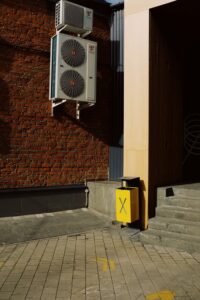Can an HVAC System Be Too Powerful for Your Home?
The short answer: yes. An HVAC unit must be properly matched to the size of your home. A too-small or too-large HVAC system will cause your home to be humid, patchily heated or cooled, and will leave you with a higher energy bill.
Why does HVAC unit size matter?
Ideally, your air conditioner–when new–should work for over half an hour before your home is at the correct temperature. If your unit runs for less than that, it’s likely oversized. If it runs for less than ten minutes, it’s definitely oversized and will create patchy areas of glacier-cold air throughout your home. The unit will also wear out more quickly if improperly sized. The more it has to shut off and start up again, the more its internal components get worn out.
Oversized air conditioners cool the air in your home quickly and then turn off. One of the functions of an air conditioner is to take in the humidity from your home and send it outside. Because oversized AC units work for only a fraction of the time of a properly-sized air conditioner, they only have a fraction of the time to dehumidify your home. The water is taken into the unit and, when the unit turns off, evaporates back into your home.
Finally, an oversized HVAC unit can cause higher energy bills. Like with a car or any machine, more energy is required to start and stop an HVAC unit than is required to continue running it. Because oversized HVAC units might turn on three times in an hour instead of once an hour (like a correctly-sized unit should), they use more energy.
What size HVAC unit should I install?
HVAC installers take into account several things when deciding what size unit is right for your home, including:
- Your home’s square footage
- Your home’s number of doors and windows
- The local climate
- Your home’s insulation levels
- Your home’s ductwork quality
- Your home’s number of rooms
These factors determine how many British Thermal Units (BTUs) your home requires to be heated or cooled. More BTUs means the HVAC unit will need to do more work. These factors can be put into a formula to determine the minimum number of BTUs your home needs:
- Multiply square footage by 25.
- Add 400 BTUs for each person you know will use a room regularly.
- Add 1000 BTUs for every window and exterior door in your home.
- Divide your final number by 12,000 to determine what tonnage of HVAC unit you need.
For example, if my home were 2,000 square feet, with three regular occupants and ten windows and doors, my math would look like this:
2,000 square feet * 25 = 50,000 BTUs
50,000 + 400 * 3 people = 51,200 BTUs
51,200 + 1000 * 10 windows and doors = 61,200 BTUs
61,200/12,000 ≈ 5 tons
In my case, an HVAC unit with a 60,000 BTU capacity–or a tonnage of 5– would be about right. However, I would still consult a professional to double-check, just in case my installation or ductwork quality made my home more difficult to heat. In order to make their estimates more accurate, professionals use these aids:
- a software called Manual J
- the heating and cooling load calculation protocol from the Air Conditioning Contractors of America
- the trade association for AC contractors
Does the efficiency of the HVAC unit matter?
More efficient units increase how quickly your home will be heated or cooled. A higher efficiency and faster cooling might seem better, especially in the summer. But a too-high efficiency can cause many of the same issues as too-large units. Higher efficiency can mean your home gets cooled too quickly, which can mean patchy heating and a worn-down unit. Additionally, higher-efficiency HVAC units require a more complicated installation.
Based on these tips, you should be able to tell whether your HVAC unit is too large or too small for your home. You should also know the ideal size for your HVAC unit. Be sure to check with your installer to see what they suggest for your specific situation–and to check their available HVAC units.
References
https://www.cooltoday.com/blog/3-problems-caused-by-an-oversized-air-conditionerhttp://www.oasiscooling.com/blog/why-an-oversized-air-conditioner-is-a-serious-problem/
https://www.energyvanguard.com/blog/55157/Why-an-Oversized-Air-Conditioner-Is-a-Bad-Idea

